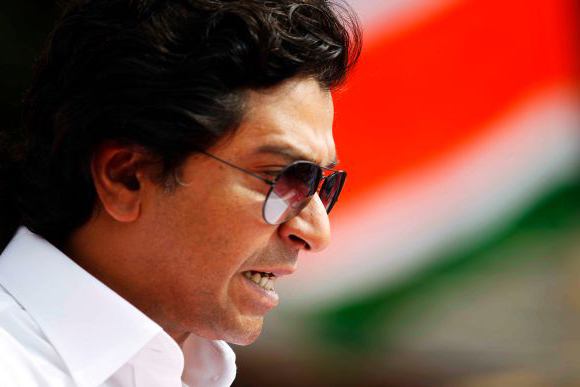
Mumbai, August 31: MNS chief Raj Thackeray on Wednesday threatened to brand Biharis "infiltrators" and force them out of Maharashtra if authorities in Bihar take legal action against Mumbai policemen who picked up a teenager from there without informing their counterparts in that state.
Thackeray, whose party has often launched violent campaigns against Hindi-speaking people in Maharashtra, was reacting to a media report that Bihar chief secretary Navin Kumar has written to Mumbai police commissioner voicing displeasure over the arrest of the youth for vandalising the martyr's memorial during Azad Maidan protest on August 11.
Thackeray said the Bihar chief secretary had threatened legal action against Mumbai police.
"The letter says Mumbai police has to get in touch with the Bihar government before picking up any person from their state. If Mumbai crime branch picks up people from their state without the knowledge of the Bihar police they would face legal action," he said referring to the purported latter.
"If the Bihar government tries to become a hurdle in the way of a police investigation, then my party would dub every Bihari in Maharashtra as an infiltrator and would force them to leave the state." an angry Thackeray said.
"The person who desecrated the Amar Jawan memorial was arrested from Bihar. I would like to tell the Bihar chief secretary that because of your state, the crime rate (in Maharashtra) has gone up," he said.
Abdul Qadir Mohammed Younus Ansari (19) was picked up by Mumbai crime branch on Monday from Sitamarhi in Bihar for vandalising the Amar Jawan Memorial near Azad Maidan during August 11 rioting at a protest called against alleged atrocities on Muslims in Assam and Myanmar. Two protesters were killed and over 50 injured, mostly policemen and those from the media.
Thackeray also questioned Bihar chief minister Nitish Kumar's silence on the issue.
"Why is Nitish Kumar is not saying anything? Where have the leaders from the state and Delhi gone? Why was the chief secretary not slammed for his remarks," he asked.
The MNS leader also demanded Maharashtra home minister R R Patil's resignation for failure to control the riots.





Comments
Add new comment